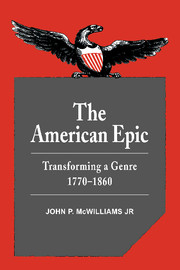4 - A White Achilles for the West?
Published online by Cambridge University Press: 22 March 2010
Summary
Dixon Wecter once remarked that “The winning of the West is the great fantasy of our Republic. It is the epic which the folk mind has looked upon as more truly American than the settlement of Jamestown and Plymouth, the spacious life of the old plantation, or the building of stone and steel.” Although Wecter did not mention the American Revolution, his claim about “the folk mind” remains useful both in the loose sense of the word “epic” (a heroic cultural achievement) and in the restrictive sense of a literary genre. In a similar vein, Constance Rourke claimed that the Promethean exploits of the Davy Crockett stories formed an oral folk epic for nineteenth-century settlers. If we update the context of such claims, their essence can be seen to remain valid. Since outer space has become America's new frontier, the durability of media series (Space Cadet, Star Trek, Star Wars) centering on exploration seems to indicate that the appeal of venturing into the unknown has far outlasted flurries of interest in the Revolution, the plantation myth, or city builders.
Throughout the nineteenth century, literary figures from the West drew up plans for never written epic poems that would describe the heroism of crossing the frontier. In an 1854 issue of The Pioneer or California Monthly, Edward Pollock argued that a great epic could and should be written on Western man and Western scenery.
- Type
- Chapter
- Information
- The American EpicTransforming a Genre, 1770–1860, pp. 94 - 120Publisher: Cambridge University PressPrint publication year: 1989

